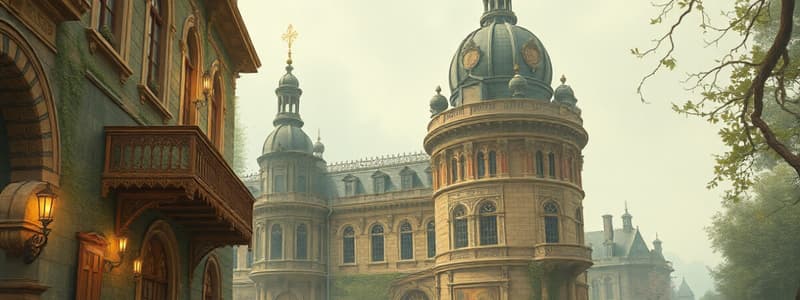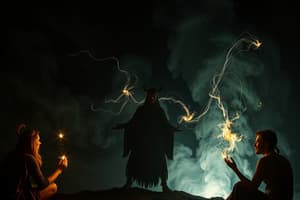Podcast
Questions and Answers
What was the primary purpose of Governor-General Narciso Claveria's decree in 1849?
What was the primary purpose of Governor-General Narciso Claveria's decree in 1849?
- To systematize the Philippine naming system using Spanish surnames (correct)
- To enforce strict regulations on family lineage
- To implement a national identity based on local languages
- To promote indigenous naming traditions
Which of the following represents one of Peter Seixas' Historical Thinking Concepts?
Which of the following represents one of Peter Seixas' Historical Thinking Concepts?
- Identifying economic trends
- Establishing historical significance (correct)
- Analyzing technological advancements
- Establishing cultural significance
Which of the following types of evidence are considered primary sources?
Which of the following types of evidence are considered primary sources?
- Textbooks summarizing historical events
- Historians' interpretations
- Modern biographies
- Official archival documents (correct)
What do historians look for in order to evaluate continuity and change over time?
What do historians look for in order to evaluate continuity and change over time?
How is the significance of historical events often determined?
How is the significance of historical events often determined?
What aspect of history does the concept of empathy encourage historians to consider?
What aspect of history does the concept of empathy encourage historians to consider?
What was one observed outcome of implementing the Catálogo Alfabético de Apellidos?
What was one observed outcome of implementing the Catálogo Alfabético de Apellidos?
What should historians consider when determining which stories to tell?
What should historians consider when determining which stories to tell?
What was a key shift in focus for cultural historians compared to social historians?
What was a key shift in focus for cultural historians compared to social historians?
What criticism was leveled against social historians in the 1980s?
What criticism was leveled against social historians in the 1980s?
Cultural historians drew upon ideas from which group when exploring ordinary people's agency?
Cultural historians drew upon ideas from which group when exploring ordinary people's agency?
Which concept became integral to cultural history, distinguishing it from social history?
Which concept became integral to cultural history, distinguishing it from social history?
How did cultural historians approach the concept of identity?
How did cultural historians approach the concept of identity?
What role did narrative play in the works of cultural historians?
What role did narrative play in the works of cultural historians?
What common perspective did social historians often adopt toward subaltern groups?
What common perspective did social historians often adopt toward subaltern groups?
Which method became a hallmark of cultural history as a response to social history's challenges?
Which method became a hallmark of cultural history as a response to social history's challenges?
What is a key element that distinguishes history from geology or astronomy?
What is a key element that distinguishes history from geology or astronomy?
How do historians generally view the reasons for historical events?
How do historians generally view the reasons for historical events?
What is necessary for taking a historical perspective?
What is necessary for taking a historical perspective?
What can be said about the emergence of cultural history in historiography?
What can be said about the emergence of cultural history in historiography?
What do historians aim to avoid regarding ethical judgments of past actions?
What do historians aim to avoid regarding ethical judgments of past actions?
What is a hallmark of taking historical perspective according to the provided content?
What is a hallmark of taking historical perspective according to the provided content?
The relationship between cultural history and social history is best described as:
The relationship between cultural history and social history is best described as:
Which aspect is emphasized by both social and cultural history?
Which aspect is emphasized by both social and cultural history?
Which theorists did New Historicists primarily borrow concepts from?
Which theorists did New Historicists primarily borrow concepts from?
What significant publication marked the cultural turn in the 1990s?
What significant publication marked the cultural turn in the 1990s?
Which concept is NOT associated with Pierre Bourdieu?
Which concept is NOT associated with Pierre Bourdieu?
What does the 'natural turn' trend in historical thought primarily involve?
What does the 'natural turn' trend in historical thought primarily involve?
Which of the following best describes the relationship between cultural historians and sociology in the 1990s?
Which of the following best describes the relationship between cultural historians and sociology in the 1990s?
What is considered a hallmark publication from the 1980s?
What is considered a hallmark publication from the 1980s?
What does the phrase 'symbolic capital' refer to in Bourdieu's theories?
What does the phrase 'symbolic capital' refer to in Bourdieu's theories?
What did the collective volume on The New Cultural History emphasize?
What did the collective volume on The New Cultural History emphasize?
What were early political scientists in the Philippines primarily concerned with during the 1960s?
What were early political scientists in the Philippines primarily concerned with during the 1960s?
What approach did psychologists in the Philippines prioritize due to their recognized professional standing?
What approach did psychologists in the Philippines prioritize due to their recognized professional standing?
Which movements profoundly impacted Philippine social sciences during the 1970s and 1980s?
Which movements profoundly impacted Philippine social sciences during the 1970s and 1980s?
How did Marxist scholars in the Philippines approach their understanding of Marxist theory?
How did Marxist scholars in the Philippines approach their understanding of Marxist theory?
What major events led to an increase in ideological debate within Philippine social sciences?
What major events led to an increase in ideological debate within Philippine social sciences?
What themes did sociologists and political scientists generally avoid before the late 1960s?
What themes did sociologists and political scientists generally avoid before the late 1960s?
What role did anthropologists continue to play in Philippine social sciences?
What role did anthropologists continue to play in Philippine social sciences?
What was a common focus area for sociologists in their research during the early years?
What was a common focus area for sociologists in their research during the early years?
Which of the following best describes the training approaches of early Philippine social scientists?
Which of the following best describes the training approaches of early Philippine social scientists?
Flashcards are hidden until you start studying
Study Notes
Introduction to Historical Thinking
- Distinguish between learning history and thinking historically
- Identify the 6 concepts of Historical Thinking by Peter Seixas:
- Establishing historical significance
- Using primary sources
- Identifying continuity and change
- Analyzing cause and consequence
- Taking historical perspectives
- Understanding the ethical dimension of historical interpretations
Cultural History vs. Social History
- Cultural history emerged in response to limitations of social history, which focused on quantitative data and group behavior
- Cultural history emphasizes individual experience, fluidity of identity, and broader cultural forces
- Cultural historians seek to bring "life" to history and explore the agency of ordinary people
- The development of cultural history drew from influences like anthropology, postmodernism, and social theorists like Foucault, Bourdieu, and Goffman
Rise of Cultural History
- Cultural history emerged to address the shortcomings of social history, which was criticized for
- Assuming social categories were experientially meaningful
- Ignoring diverse perspectives
- Adopting dominant perceptions of marginalized groups
Evolution of Cultural History
- The "natural turn" in cultural history emphasizes:
- Ecology
- Neuroscience
- Biology
Social Science in the Philippines
- Social scientists in the Philippines aimed to apply their skills in a way that would be beneficial to the country, drawing from principles of modernization
- Disciplines like political science, psychology, anthropology, and sociology played important roles in addressing societal issues
- Marxist thought emerged in the late 1960s and 1970s, fueled by discontent with traditional social science perspectives, and inspiring debates regarding Philippine political, economic, and ideological structures in a post-colonial context
- The indigenization of knowledge was also a significant movement during this period, challenging prevailing knowledge frameworks.
Studying That Suits You
Use AI to generate personalized quizzes and flashcards to suit your learning preferences.




